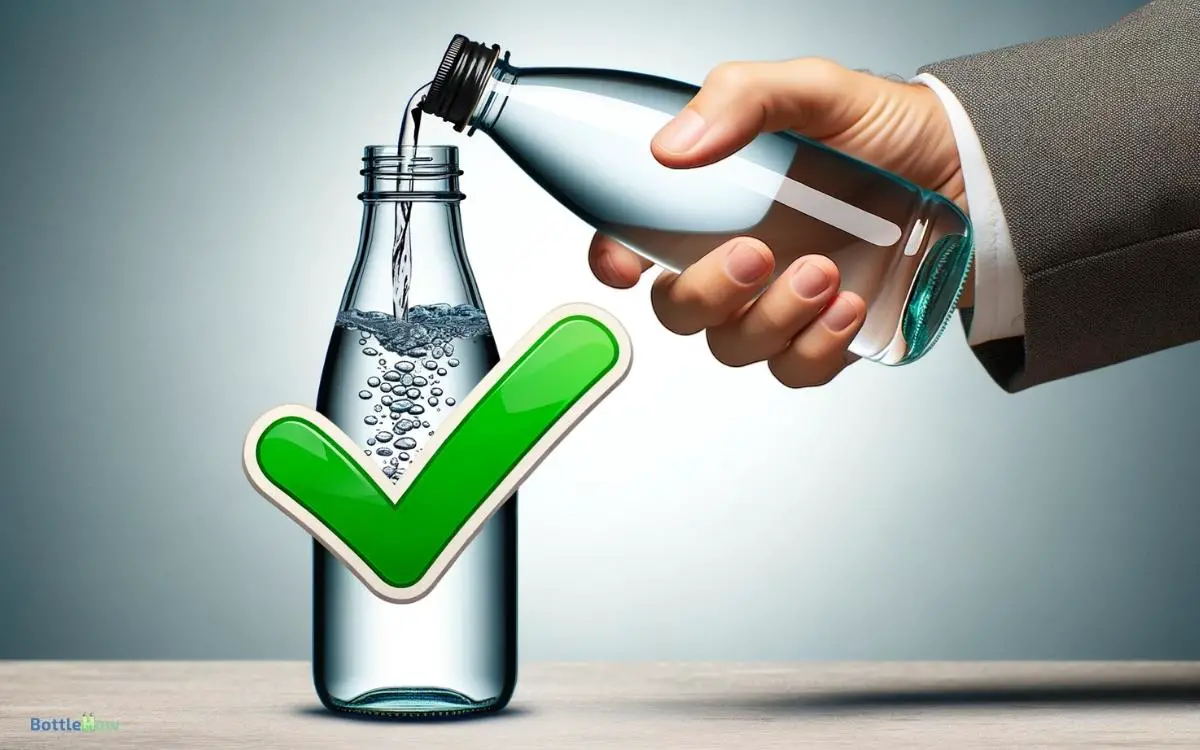Can You Put Alcohol in a Metal Water Bottle? Yes!
You can put alcohol in a metal water bottle, but it’s important to take into account the type of metal.
Stainless steel is generally safe due to its corrosion resistance and non-reactive properties, making it suitable for ethanol.
Aluminum, however, can corrode and may require a protective lining. Avoid copper bottles, as alcohol accelerates corrosion and poses health risks due to metal leaching.
Note that the type of alcohol also affects reactivity; ethanol is low risk, while methanol is highly corrosive.
For best results, choose food-grade stainless steel bottles and make sure they’re well-maintained to prevent contamination. Explore further to understand specific material interactions and best practices.

Key Takeaways
Understanding Metal Water Bottles
Metal water bottles, typically made from stainless steel or aluminum, are designed to be durable, reusable, and capable of maintaining the temperature of liquids for extended periods.
You’ll find that these bottles often feature double-walled insulation, which effectively minimizes heat transfer.
This construction allows them to keep beverages hot or cold for several hours, enhancing their utility.
Additionally, these bottles are engineered to resist corrosion and physical impacts, ensuring long-term usage.
The materials used are non-reactive, preventing undesirable chemical interactions with most liquids.
However, it’s important to understand how different substances, like alcohol, interact with metal surfaces, as this can affect both the liquid’s quality and the bottle’s longevity. Proper care and usage are essential for optimal performance.
Types of Metals Used
When considering metal water bottles for storing alcohol, you should evaluate the properties of stainless steel, aluminum, and copper. Stainless steel offers durability and resistance to corrosion, making it a popular choice.
Aluminum bottles are lightweight but may require an inner lining, while copper bottles have antimicrobial properties but can react with certain liquids.
Stainless Steel Composition
Stainless steel, primarily composed of iron, chromium, and nickel, offers durability and resistance to corrosion, making it an ideal material for water bottles.
Its composition provides several key benefits:
- Corrosion Resistance: Chromium forms a passive layer of chromium oxide, preventing rust.
- Strength and Durability: Iron guarantees the bottle can withstand physical impacts.
- Resistance to Chemical Reactions: Nickel enhances the bottle’s ability to withstand reactions with various substances, including alcohol.
- Hygienic Properties: The non-porous surface prevents bacterial growth and is easy to clean.
Understanding these elements ensures you’re aware of why stainless steel bottles maintain their integrity when storing different liquids.
Their robust composition not only prolongs the bottle’s lifespan but also guarantees the safety of the contents.
Aluminum Bottle Properties
Aluminum water bottles, known for their lightweight construction and excellent heat conductivity, offer distinct benefits and drawbacks compared to their stainless steel counterparts.
You’ll find that aluminum bottles are more portable due to their light weight, but they can dent more easily. Additionally, they conduct heat quickly, which can affect the temperature of your drink.
| Property | Aluminum Bottles |
|---|---|
| Weight | Lightweight |
| Durability | Easily Dents |
| Heat Conductivity | High |
| Corrosion Resistance | Requires Lining |
| Environmental Impact | Recyclable |
Aluminum bottles often require an internal lining to prevent corrosion and interaction with acidic contents like alcohol.
Be mindful of potential leaching if the lining is compromised. These attributes make aluminum a mixed choice for storing alcohol.
Copper Bottle Characteristics
Copper bottles, like their aluminum counterparts, offer unique properties that influence their suitability for storing alcohol.
You need to take into account several key factors:
- Reactivity: Copper is highly reactive with acidic substances, which includes many alcoholic beverages. This can lead to unwanted chemical reactions.
- Taste Alteration: Storing alcohol in copper can alter its taste, often negatively.
- Health Risks: Prolonged exposure to copper can result in copper leaching into the liquid, posing potential health risks.
- Corrosion: Alcohol can accelerate the corrosion process in copper, leading to material degradation.
Given these points, copper bottles are generally unsuitable for alcohol storage. Understanding these characteristics helps you make informed decisions about the types of metal bottles appropriate for your needs.
Alcohol and Metal Reactions
When you place alcohol in a metal water bottle, you need to take into account corrosion and material integrity, as different metals react uniquely with alcohol.
The type of alcohol used, such as ethanol or isopropanol, can greatly impact these reactions.
Additionally, metal coatings may interact with alcohol, resulting in potential contamination or degradation.
Corrosion and Material Integrity
You need to understand how alcohol can interact with metal surfaces and potentially lead to corrosion, affecting the material integrity of your water bottle.
Alcohol can cause various types of corrosion depending on the metal type and conditions. Key factors influencing this interaction include:
- Alcohol Concentration: Higher alcohol concentrations tend to accelerate corrosion.
- Metal Type: Stainless steel resists corrosion better than aluminum when exposed to alcohol.
- Exposure Duration: Prolonged contact can increase the risk of material degradation.
- Temperature: Elevated temperatures can exacerbate corrosive reactions.
Alcohol Type Considerations
Different types of alcohol interact uniquely with metal surfaces, influencing the rate and nature of corrosion.
You’ll find that ethanol, methanol, and isopropanol have varying effects on metals like stainless steel and aluminum. Ethanol tends to be less reactive, making it safer for short-term storage.
Methanol, however, is more aggressive, particularly with aluminum, accelerating corrosion. Isopropanol falls somewhere in between but still poses risks over prolonged exposure.
| Alcohol Type | Corrosion Potential |
|---|---|
| Ethanol | Low |
| Methanol | High |
| Isopropanol | Moderate |
| Butanol | Low to Moderate |
Understanding these interactions helps you make informed decisions when storing alcohol in metal containers. Always consider the specific type of alcohol and the metal to avoid potential issues.
Metal Coating Reactions
Metal coatings react with alcohol by forming various compounds that can either protect the metal or accelerate its degradation.
Understanding these interactions is essential when contemplating storing alcohol in a metal water bottle.
Here are key points to ponder:
- Type of Metal Coating: Stainless steel is generally resistant to alcohol, while aluminum may corrode without a protective coating.
- Alcohol Concentration: Higher alcohol concentrations can lead to more aggressive reactions, potentially compromising the metal’s integrity.
- Coating Integrity: Scratches or wear in the coating can expose the metal, leading to accelerated corrosion.
- Chemical Reactions: Certain coatings may react with alcohol to form harmful byproducts, affecting both the container and the liquid.
Carefully evaluate these factors to ensure safe storage of alcohol in metal bottles.
Health Implications
When storing alcohol in a metal water bottle, it’s important to take into account potential health risks due to chemical reactions between the metal and the alcohol.
Certain metals, like aluminum, can leach into the alcohol, especially if it’s highly acidic or has been stored for an extended period.
This leaching can lead to the ingestion of metal ions, which may pose health risks such as neurological issues or gastrointestinal irritation.
Additionally, some metal bottles have linings that could degrade when in contact with alcohol, potentially releasing harmful substances like BPA.
To minimize risks, always verify the bottle’s material compatibility with alcohol and check for any health-related advisories from the manufacturer. Safety should be your priority when storing consumable liquids.
Taste and Flavor Impact
When you put alcohol in a metal water bottle, you risk metallic taste transfer, which can alter the beverage’s intended flavor profile.
This interaction may lead to significant alcohol flavor alterations, impacting your drinking experience.
Additionally, there’s a potential risk of beverage contamination due to the reactive nature of some metals.
Metallic Taste Transfer
You may notice a metallic taste when storing alcohol in a metal water bottle, which can greatly alter the beverage’s flavor profile. This taste transfer is due to the interaction between the alcohol and the metal surface.
To understand this phenomenon, consider these factors:
- Material Composition: Different metals (e.g., stainless steel, aluminum) have varying reactivity levels with alcohol.
- Surface Coating: Bottles with an internal lining may reduce metallic taste transfer.
- Storage Duration: Prolonged contact increases the likelihood of taste alteration.
- Alcohol Type: Higher alcohol content can exacerbate metallic taste absorption.
Alcohol Flavor Alterations
The interaction between alcohol and a metal water bottle can greatly alter the drink’s flavor profile, impacting both taste and aroma.
When alcohol contacts metal, it can cause a chemical reaction that may introduce metallic notes or an off-flavor, diminishing the quality of your beverage.
This reaction is more pronounced with certain metals, particularly those that aren’t stainless steel. The metal’s thermal conductivity can also affect the alcohol’s temperature, further changing its taste.
Additionally, alcohol may accelerate the leaching of metal ions into the drink, leading to undesirable flavors.
To preserve the intended flavor profile of your alcohol, it’s crucial to assess the material of your container and whether it’s suitable for storing alcoholic beverages.
Beverage Contamination Risk
Beyond altering the flavor, storing alcohol in a metal water bottle poses a significant risk of beverage contamination, potentially introducing harmful substances into your drink.
The interaction between alcohol and metal can lead to leaching, where metals dissolve into the beverage. This leaching can impact both taste and safety.
Consider the following:
- Material Reactivity: Metals like aluminum can react with alcohol, leading to unwanted chemical reactions.
- Corrosion: Alcohol can accelerate the corrosion of certain metals, introducing metal ions.
- Health Risks: Consuming leached metals can pose health risks, including gastrointestinal issues.
- Flavor Degradation: Metal ions can alter the intended flavor profile of the alcohol, degrading quality.
To ensure safety, use containers specifically designed for alcohol storage.
Temperature Retention
When storing alcohol in a metal water bottle, its temperature retention properties become a critical factor that must be taken into account.
Metal water bottles, especially those made from stainless steel, provide excellent insulation. This guarantees that your alcohol maintains its desired temperature for extended periods.
If you prefer your drink cold, a double-walled, vacuum-insulated metal bottle will keep it chilled much longer than a plastic or glass alternative. Conversely, if you need to maintain warmth, these bottles excel in preserving heat.
However, you should also be mindful of condensation and the rapid temperature changes alcohol can undergo.
Understanding these properties will help you optimize your drinking experience and make sure the alcohol remains at the ideal temperature.
Durability Concerns
While temperature retention is essential, you must also consider the durability of metal water bottles when storing alcohol. Metal water bottles are generally robust, but alcohol can pose specific challenges.
Here are four key considerations:
- Corrosion Resistance: High-proof alcohol can corrode certain metals over time. Make sure your bottle is made of stainless steel or another corrosion-resistant material.
- Structural Integrity: Alcohol can affect rubber seals and gaskets, potentially leading to leaks. Check the condition of these components regularly.
- Impact Resistance: Metal bottles are prone to dents and dings which could compromise the container’s integrity, especially when filled with liquid.
- Temperature Extremes: Alcohol can expand and contract with temperature changes, stressing the metal. Avoid exposing the bottle to extreme temperatures.
Cleaning and Maintenance
Regular cleaning is essential to prevent any residual alcohol from affecting the taste and safety of future beverages stored in your metal water bottle. Start by rinsing the bottle with warm water immediately after use.
For a thorough clean, mix a solution of mild dish soap and water, using a bottle brush to scrub the interior.
Avoid abrasive cleaners, as they can damage the metal. Rinse thoroughly to guarantee no soap residue remains.
For stubborn odors or residues, use a mixture of vinegar and baking soda. Fill the bottle halfway with vinegar, then add a tablespoon of baking soda. Let it sit for 15 minutes before rinsing.
Dry completely before storing to prevent mold or bacteria growth. Regular maintenance guarantees longevity and safety.
Insulated Vs. Non-Insulated
Understanding whether to choose an insulated or non-insulated metal water bottle can greatly impact the storage and quality of your beverages, including alcohol.
When making this decision, consider the following:
- Temperature Control: Insulated bottles keep liquids at a consistent temperature, ideal for maintaining the chill of alcoholic beverages.
- Condensation: Insulated bottles prevent external condensation, avoiding slippery surfaces.
- Durability: Non-insulated bottles are usually lighter and may be more durable for outdoor activities.
- Cost: Insulated bottles typically cost more due to their advanced construction.
Insulated bottles are excellent for preserving temperature and preventing condensation. Non-insulated bottles, on the other hand, offer simplicity and durability. Choose based on your specific needs and preferences for storing alcohol.
Safety Tips
Guaranteeing the safe storage of alcohol in a metal water bottle requires adherence to specific guidelines to prevent contamination and maintain beverage integrity.
To begin with, verify that the bottle is made from food-grade stainless steel, which resists corrosion and doesn’t leach chemicals.
Clean the bottle thoroughly before use, using a mixture of warm water and mild soap, followed by a thorough rinse.
Avoid storing acidic alcohols like wine or citrus-infused spirits, as they can react with the metal, altering the taste and potentially causing leaching.
Make sure the bottle’s seal is intact to prevent spills and exposure to air, which can affect the alcohol’s quality. Regularly inspect the bottle for dents or damage, which can compromise its safety.
Alternatives to Metal Bottles
When considering alternatives to metal bottles for storing alcohol, glass containers offer an excellent option due to their non-reactive properties and ability to preserve flavor.
Glass doesn’t interact with alcohol, guaranteeing that the taste remains unaltered. Additionally, it’s easy to clean and doesn’t retain odors.
Here are some advantages of using glass containers:
- Non-reactive Surface: Guarantees no chemical reactions with alcohol.
- Preservation of Flavor: Maintains the integrity and taste of the beverage.
- Ease of Cleaning: Simplifies maintenance and hygiene.
- Odor Resistance: Prevents residual smells from previous contents.
Popular Metal Bottle Brands
Several metal bottle brands have gained popularity due to their durability, insulation properties, and sleek designs.
Here’s a standard table summarizing the key features of the mentioned metal bottle brands:
| Brand | Insulation Technology | Temperature Retention | Special Features | Material Quality |
|---|---|---|---|---|
| Hydro Flask | TempShield™ Double-Wall Vacuum Insulation | Excellent thermal retention | Sleek design | High durability |
| YETI | Double-Wall Vacuum Insulation | Effective thermal retention | No Sweat™ design to maintain dry hands | Robust build |
| S’well | Triple-Layered Vacuum Insulation | Cold for 36 hours, Hot for 18 hours | Stylish design | High-quality materials |
| Klean Kanteen | Climate Lock™ Double-Wall Vacuum Insulation | Improved temperature control | Eco-friendly design | High durability |
| Contigo | AUTOSEAL® Technology | Effective thermal retention | Spill-proof performance | Durable materials |
Each brand excels in different aspects, offering a wide range of choices.
User Experiences and Reviews
Many users have shared their experiences and reviews, highlighting the performance and reliability of various metal water bottle brands when used to store alcohol.
You’ll find several consistent themes:
- Material Integrity: High-quality stainless steel bottles maintain structural integrity without reacting with alcohol.
- Seal Effectiveness: Bottles with robust seals prevent leaks, even with alcohol’s thinner viscosity.
- Taste Preservation: Premium bottles don’t impart any metallic taste, preserving the alcohol’s flavor.
- Temperature Maintenance: Insulated metal bottles effectively maintain the desired temperature of alcoholic beverages.
These insights reveal that selecting a well-reviewed, high-quality metal bottle is essential. Pay attention to user feedback on these specific points to ensure your chosen bottle performs well with alcohol. This approach guarantees reliability and satisfaction in practical applications.
Conclusion
To sum up, placing alcohol in a metal water bottle isn’t the best idea. Metal types like aluminum and stainless steel can react with alcohol, potentially affecting your health and altering the taste, reminiscent of a spoiled potion from a wizard’s cauldron. Over time, this reaction may also weaken the bottle’s interior lining, leading to leaks or contamination. Just as fizzy drinks in plastic bottles can lose their carbonation and take on a slightly plastic-like taste, storing alcohol in metal containers may result in unwanted flavors and a less enjoyable experience. For a safer alternative, consider using glass or high-quality, food-grade containers designed specifically for alcohol storage.
Opt for safer alternatives like glass or specialized containers. Follow these guidelines to guarantee your drinks are both safe and enjoyable, just like the perfect brew from your favorite fantasy tavern.



